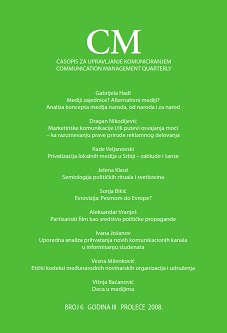Mediji zajednice? Alternativni mediji? Analiza koncepta medija naroda, od naroda i za narod
‘Community Media’? ‘Alternative Media’? Unpacking Approaches to Media by, for and of the People
Author(s): Gabrijela HadlContributor(s): Jelena Kleut (Translator)
Subject(s): Media studies, Politics and communication, Theory of Communication, Sociology of Politics
Published by: Fakultet političkih nauka Univerziteta u Beogradu
Keywords: community media; alternative media; democratic communication; communication theory;
Summary/Abstract: If, as political economists would have it, News Corporation, Globo and the BCC are ‘the media,’ how can we talk about media by, for and of the people, or our media as they are sometimes called? How do we frame them for research, activism or policy? Long dispersed and marginalized, the last few years have seen a “renaissance” of research on practices variously labelled ‘alternative media’ (cf. Downing 1984, Downing et al. 2001, Kidd 1999), ‘citizens’ media’ (cf. Rodriguez 2001, 2004), ‘community media’ (cf. Howley 2001, AMARC & CMFE 2006, Carpentier, Lie & Servaes 2003) ‘tactical media,’ ‘autonomous media’ and more (Rodriguez 2004). Networks of research and practice are growing, prominent among them OURMedia/NUESTROSMedios (ourmedianet.org). Alongside a new wave of movements on communication, a field of alternative media studies is (re-)emerging (Rodriguez 2004, Dervin & Huesca 1994). However, its key terminologies and theories are still unformed. A variety of approaches, only vaguely aware of each other’s histories (and even their own), are currently competing and merging into a post-modern pasticcio that obscures important differences of power and ideology. This lack of clarity on ideological position, historical context and definition of objects hinders the progress of the field. It also presents practical problems for those trying to network, lobby and build public awareness for the democratic relevance of alternative and community media practices (Ó Siochrú 1999). Activists recognized over a decade ago the need for a “recognizable identity” for the communication practices of social movements, local communities and socially engaged individuals. They argued that a clear idea of what this sector represents is critical to democratizing the international system of communication (Ó Siochrú 1999). What are the relative advantages of using one approach and its terminology over another? Research has so far avoided clear answers (cf. Downing 2001, Gumucio Dagron 2004, Rodriguez 2001). This paper begins to fill this knowledge gap by reviewing four of the prominent traditions of research, focusing on the key terms (or frames) ‘alternative’ and ‘community media.’ The result is a more nuanced and detailed picture of the options for approaches to our media, and thus for developing democratic theories of communication.
Journal: CM Komunikacija i mediji
- Issue Year: 3/2008
- Issue No: 6
- Page Range: 5-27
- Page Count: 23
- Language: Serbian

